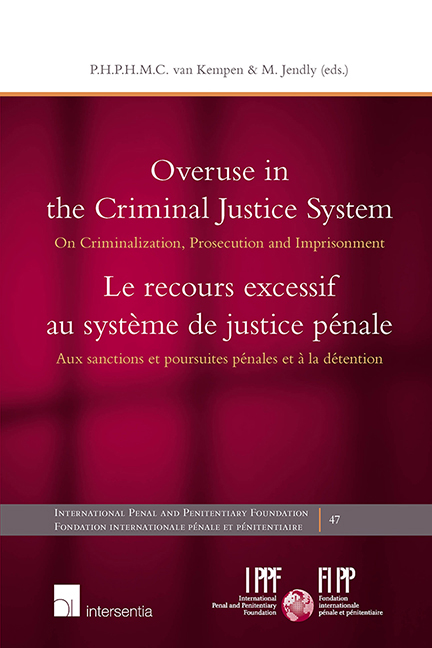Book contents
- Frontmatter
- Dedication
- Contents
- Acknowledgements
- Remerciements
- PART I INTRODUCTORY SYNTHESIS AND ANALYSES 1ÈRE PARTIE. SYNTHÈSE ET ANALYSES INTRODUCTIVES
- PART II THEMES 2ÈME PARTIE. THÈMES
- PART III NATIONAL REPORTS 3ÈME PARTIE. RAPPORTS NATIONAUX
- Overuse in the Criminal Justice System in Argentina
- Le recours au système de justice pénale en Belgique: état des lieux et perspectives
- Overuse of Criminal Law in Finland
- Overuse in the Criminal Justice System in Germany
- Overuse in the Criminal Justice System in Greece
- Overusing the Criminal Justice System: the Case of Ireland
- Overuse in the Criminal Justice System in Japan
- Tendencies of Overuse in Criminal Law Policy and Criminal Law Enforcement in the Netherlands
- Overuse in the Criminal Justice System in New Zealand
- Overuse in the Criminal Justice System in Nigeria
- Overuse in the Criminal Justice System in Poland
- Overuse in the Russian Criminal Justice System
- Overuse in the Criminal Justice System in Spain
- Recourt-on de manière excessive au système pénal en Suisse?
- Overuse of the Criminal Justice System in Taiwan
- Overuse and Underuse of the United States Criminal Justice System in the Area of Business Crimes
- The International Penal and Penitentiary Foundation: history and purpose
- La Fondation internationale pénale et pénitentiaire: histoire et objectif
- The IPPF Series
Overuse in the Criminal Justice System in Argentina
from PART III - NATIONAL REPORTS 3ÈME PARTIE. RAPPORTS NATIONAUX
Published online by Cambridge University Press: 26 June 2019
- Frontmatter
- Dedication
- Contents
- Acknowledgements
- Remerciements
- PART I INTRODUCTORY SYNTHESIS AND ANALYSES 1ÈRE PARTIE. SYNTHÈSE ET ANALYSES INTRODUCTIVES
- PART II THEMES 2ÈME PARTIE. THÈMES
- PART III NATIONAL REPORTS 3ÈME PARTIE. RAPPORTS NATIONAUX
- Overuse in the Criminal Justice System in Argentina
- Le recours au système de justice pénale en Belgique: état des lieux et perspectives
- Overuse of Criminal Law in Finland
- Overuse in the Criminal Justice System in Germany
- Overuse in the Criminal Justice System in Greece
- Overusing the Criminal Justice System: the Case of Ireland
- Overuse in the Criminal Justice System in Japan
- Tendencies of Overuse in Criminal Law Policy and Criminal Law Enforcement in the Netherlands
- Overuse in the Criminal Justice System in New Zealand
- Overuse in the Criminal Justice System in Nigeria
- Overuse in the Criminal Justice System in Poland
- Overuse in the Russian Criminal Justice System
- Overuse in the Criminal Justice System in Spain
- Recourt-on de manière excessive au système pénal en Suisse?
- Overuse of the Criminal Justice System in Taiwan
- Overuse and Underuse of the United States Criminal Justice System in the Area of Business Crimes
- The International Penal and Penitentiary Foundation: history and purpose
- La Fondation internationale pénale et pénitentiaire: histoire et objectif
- The IPPF Series
Summary
INTRODUCTION
As an introductory note to the topic of this chapter, we would like to refer to the comments presented in the introduction of our work on the various forms of deprivation of liberty prior to the final judgment in the Argentine Republic. Given the federal, republican and representative system of government adopted under Section 1 of the Argentine Federal Constitution, the enactment of the civil, commercial, criminal, mining, and labour and social security codes, as well as of general laws applicable throughout country, lies within the powers of the Federal Congress only (Section 75(12)), which means that these bodies of regulations apply to the whole territory of the country. On the other hand, the enactment of procedural rules lies within the powers of the provinces, which, in exercising such power, are entitled to pass their own codes of procedure, including the code of criminal procedure, which is the one we will be dealing with in this work. Based on time, extension, and specificity reasons, this work will only focus on the federal jurisdiction and the jurisdiction of the city of Buenos Aires; however, it should be noted that there are no significant differences in the regulation of coercive measures (involving deprivation of liberty) within those jurisdictions and the jurisdictions of the rest of the provinces. This chapter will only refer to individuals over 18 years of age.
OVERUSE OF CRIMINALIZATION
Under the Argentine legal system, both substantive law – such as the CC – and procedural law – such as the FCCP and similar codes of the provinces and City of Buenos Aires – as well as any other law, must be in line with the provisions of the FC, which is our fundamental law, and international treaties of constitutional rank (as per Sections 5 and 31 of the FC).
Under Section 75(22) of the FC, ”…
- Type
- Chapter
- Information
- Overuse in the Criminal Justice SystemOn Criminalization, Prosecution and Imprisonment, pp. 253 - 274Publisher: IntersentiaPrint publication year: 2019



